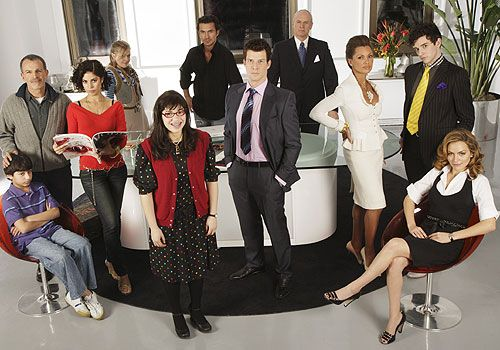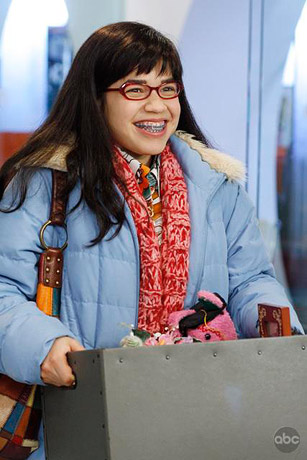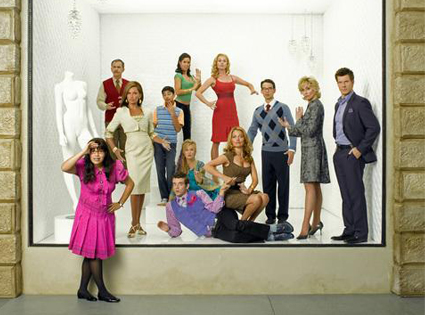Rooting for Betty
by: Mary Beltrán / University of Wisconsin-Madison

So here's the question: What to make of a television series that finally has a Latina lead character who is smart, sensitive, and interesting enough to compel me to watch each week to see how she is faring – but on the other hand who is, well, ugly? Or rather, clueless (particularly given that America Fererra, who portrays Betty, is far from ugly), with respect to being unable to dress appropriately for her high-powered job at Mode, a Vogue-like fashion magazine. I've waited a long time to be able to turn on network television and find a lead character like Betty Suarez. And yet I can't help but wonder if the premise of the series, based on the phenomenally popular Spanish-language telenovela Yo Soy Betty La Fea (literally, I Am Betty the Ugly), along with Betty's bushy eyebrows and lack of sophisticated fashion sense (does she not even flip through Mode?), perhaps have distorted meanings when set within the context of U.S. race relations. While it is true that we have witnessed a growth in Latina representation in the last decade, I'm not sure these images have grown in number and variety to the extent that the story of a Mexican American woman who will never fit into the world of fashion and beauty can yet be understood as an allegory for how “Betty is beautiful on the inside.” There are moments on the show, particularly when Betty's coworkers have a laugh at her expense, when it seems primarily focused on how a working-class Mexican American girl is rightly marginalized.

There is much more to the series than that, however, which is why I continue to tune in and likely why it continues to be popular with other viewers as well. Betty is a fairly complex character who is beginning to demand that she be able to be herself and be accepted in settings in which being thin, white, rich, and disengenuous typically have been prerequisites. And her family, while at first glance composed of Latin types that we all have seen before, is developing more shades of gray in recent storylines, despite the series' reliance on melodramatic story turns such as the revelation of Betty's father's manslaughtering past. As I noted in my position paper for the Flow conference, I see Ugly Betty as a positive step in network efforts to reach out to their growing Latino audience. There in fact appear to be many Latino viewers watching the show and rooting for its survival. I recently happened across an on-line discussion by fans over Betty's ugliness. Several fans pointed out the Latin American roots of the storyline and made it clear that, given this knowledge and their fond memories of the original, they didn't find Betty's appearance an issue in this new, U.S. version. What one viewer smartly pointed out, however, is that in the original series, which in novela style lasted only a few months, Betty undergoes a makeover at the culmination of the story, which brings her outer self into alignment with her inner beauty. Because U.S. series typically last much longer, however, we can count on seeing far more of Betty's “ugliness.” Not to imply that Betty needs a makeover in order to be a positive role model for other Latinas, but it seems that an ugly-duckling series premise that makes the duckling a Latina threatens to equate beauty and worthiness with whiteness.

I should stress, too: I'm still rooting for Betty. The series might provide a more empowering representation over time, particularly given America Fererra's ability to imbue Betty Suarez with an unmistakable intelligence and wit even in the face of the onslaught of overpriced designer clothes and cruelty that she faces. Already she maintains a level of grace and integrity that shines through, behind the glasses, brows and braces. But do other viewers, particularly non-Latino viewers, see it? It may depend on their perceptions before they tune in, what the implications of this Betty ultimately will be.
Image Credits:
1. ABC’s Ugly Betty
2. America Fererra, Betty
3. The cast of Ugly Betty
Please feel free to comment.
totems
A really interesting piece Mary. I wonder if we are once again seeing the racialized totems of “authenticity” being played out on Betty’s body? Is she just another crying Native American bemoaning the polluted soul of US beauty and body politics or is there more to her than the “other” being used to critique the “norm”?
totems
I wonder as well. In many ways the tension of the narrative seems to be whether the “mainstream” employees will be touched by Betty or not, in other words whether “we” can be saved.
I have to agree to your piece about “Ugly Betty” because it is a show that has great potential for Latinas in American television. Considering all the stereotypes that we come across on television about african-americans, latin-americans, and irish-americans among others, “Ugly Betty” seems to be on a different level than other shows. Think about the way Betty presents herself. She is confident, intelligent, and has a good feeling about who she is. Now, think about all the other shows about minority groups whose sitcoms are primarily making fun of their characters. Betty has come a long way from shows such as “Good Times” and “The Jeffersons.” The minorities in these groups acted like clowns, unsuccessful, and not very intelligent. For minorities, it has been a long road but having a show like “Ugly Betty” shows America that while yes, we laugh at her outfits and clumsiness, we also admire the way she carries herself. She works in a very critical job with a boss who is incredibly mean. However, she has courage, determination, and her inner beauty shines through her bushy eyebrows, braces, and all that hair. She represents a new stereotype, I think, of a woman in motion and change. A change that breaks the barriers of the American norm. Betty is a woman to be admired by all women. That is the best thing about this show. Betty, while considered ugly by our standards, is beautiful, engergetic, smart, and more importantly has a great humor about herself.
I really enjoyed this piece, Mary, because I have had similar feelings about Ugly Betty. For instance, the episode featuring her “Queens makeover” struck me as problematic along the lines of your argument. It’s easily my favorite new show, though, because it seems so fresh and different in everything from the prominence of Latino/a characters to its visual style. But as both a media scholar and a straight white female prone to liberal guilt, I have had some questions about its representations of race and sexuality. I actually found myself recently searching through websites like afterelton.com to get a sense of what the gay community thought of the depictions of Justin and Marc, as if I needed to know that it was “ok by them” to find those characters entertaining despite (or is it because of?) their offerings of stereotypical signifiers. But I think what I do find redeeming about the show thus far is its continued productive acknowledgement of race, gender, and class differences and particularly the ways those acknowledgements bounce around the various characters, without Betty always having to be the primary pivot. Wilhelmina is an intriguing wild-card; I’ve only noticed one reference to her race (the hilarious line to Daniel: “did you just gesture at me when you said Kwanzaa?”). But thus far they’ve done a pretty good job of fleshing out the characters, so I look forward to seeing where it heads.
I have never seen “Ugly Betty” but from reading the article I get the general idea of the show. However, I have seen many other shows portraying women/minorities and many of them have not been good. I do think that “Ugly Betty” has something to offer because it is different. Many shows portray women as sexual obejects, and their sex appeal is what gets them ahead in life. “Ugly Betty” is differnt becuase she is considered “ugly” but she is smart engouh to use her intelligence and inner beauty to get her to where she is at. This show has something else to offer to young women becuase it shows them that beatuy is not everything or that important and it also shows women that they can be successful without flaunting themselves as sexual objects. This show can help the media represent women in a more positive and diverse way.
Although I have not seen the show “Ugly Betty,” after reading this article I have become interested in giving it a try. The last Latino based show I remember seeing was the George Lopez Show and that left me with a sour taste in my mouth. I realize that George Lopez is a comedian but using that, “I am Spanish so when I make fun of Spanish people it is ok attitude” does not float with me. I like to hear about a show that speaks about the struggle of minorities in a white dominated world, especially when it brings to light many of the everyday stereotypes about beauty and brains. I believe in order for a show to last especially a show dealing with minorities, it must be done tastefully. The fact still remains that at the end of the day white Americans will be making up a high percentage of the ratings, but if the show does not degrade an individual’s race for ratings, I believe it is a step in the right direction for minorities such as Latinos. There is always a thin line when using humor when dealing with issues of race, because the question always arises, “is the audience laughing with me or at me?” It seems that with the show Ugly Betty it will probably be a combination of both.
Ugly Whiteness?
Neat discussion, Mary. I, too, have been following “Ugly Betty” primarily to see new representations of girls or the invocation of the term (girl power, “mean girls”, girls-gone-wild, gilmore girls, etc.) at an intriguing time of ‘post-feminism’ and when girls studies is becoming a branch of women’s studies.
I am also thinking about issues of race and neo-liberal notions of consumerism where ‘the girl’ might already be configured as a white consumer, and girlhood is a necessary oppositional stage to ‘woman’ in order for her to go through a transformation process but bypass any kind of political identity politics like feminism (and, thus just arrive as liberated, empowered, independent or whatever at age 20 or 30, or in the case of Friends characters, nearly 40!). Could the age demarcation itself: of girl – to young woman – to woman be doing the work of both post-feminism and whiteness?
I worry, though, when ‘whiteness’ gets invoked as a racial blank slate of everything positive (here beauty, acceptance for Betty) when we really lack conceptual tools to talk about whiteness as anything other than privilege and dominance.
Especially as beauty transformations (and, I’m thinking of make-over reality shows, too), whiteness for middle class women isn’t a given — it’s a process, it’s work: the labor of make-up.
After all the ‘unpacking the invisible knapsack’ stuff for white privilege, I’d be interested to hear your’s and others’ thoughts on whiteness and girlhood in light of this increase in contemporary representations of girls and young women.
Hmmmm…all very interesting comments, if perhaps a little too cerebral in some cases. So, which character are we supposed to consider ugly? Those emaciated creatures lurking in the background? By the way, people are people. Who needs the race thing hashed out once more? Give it a rest, already. Anyway, great show, with lots of heart. So glad so many folks agree. Nice position paper, Mary. Thanks, America and company!
I love the issue here Mary. I am a non-Latino viewer, but the issue of race is very interesting in the show. I actually just started watching, so there are some episodes I’ve missed out on. But I love what I’ve seen. I love that this show is about a working class Mexican-American girl working in a world where she doesn’t fit in all based on the way she looks. It gives her character such a challenge, but she shines through so well. I missed the story line of how she got the job, so I’m wondering if looks were an issue in getting the job in the first place? Either way, I love how she’s “Ugly”. For me, Betty being ugly represents all women who don’t feel like they fit in. It’s not just an issue of race, its being a women all together. I love how Betty is the girl who represents what most of us wish we could be, ourselves. But in society today that’s not such an easy thing to do. I wish Betty much success, and I can’t wait for the season to come out so I can see it from the beginning.
Whiteness
At first glance, I considered this show another lame attempt to incorporate minorities into television programming and that in the end the show would only reinforce white supremacy (with respect to power) ideologies. However, I found that although certain aspects of the show can be considered stereotypical, it presents a counter-hegemonic message that can serve as a role model for many Latina girls.
I first came to the conclusion that the show supported white superiority because of the fact that Betty was made to be “ugly” and poor and all the other white characters were stylish and powerful economically and within Mode. But once the show highlighted and promoted Betty’s intellectual, and moral superiority, it became evident the show offered a counter-hegemonic reading to its initial representations. The fact that Betty can be unattractive, be content with her appearance, be successful, and hold to her moral beliefs and values in the face of society’s and Mode’s pressures to done the appearance of Whiteness is a testament to her character and importance.
I am very satisfied with Betty as a character- I am however more concerned about how gay men are represented especially through Marc and Justin- I wish that the would try to rely on so many gay stereotypes to create a comedic relief.
I was just wondering I have seen studies on Latino representation on network news via NAHJ brownout studies but are there studies that quantify or attempt to analyze how many Latinos are on TV and what the representation is like in comparison with “the past” ? (in response to statement: “While it is true that we have witnessed a growth in Latina representation in the last decade…”